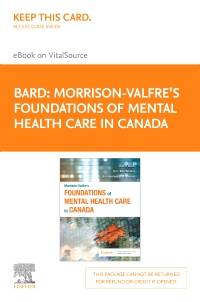
Morrison-Valfre’s Foundations of Mental Health Care in Canada - Elsevier eBook on VitalSource (Retail Access Card), 1st Edition
Elsevier eBook on VitalSource - Access Card

Help your students build a broad fundamental knowledge of Canadian mental health concepts and disorders! Morrison-Valfre’s Foundations of Mental Health Care in Canada uses an easy-to-read, multidisciplinary approach to describe current therapeutic interventions and treatments for mental health conditions. Ideal for nurses and other caregivers, this guide provides concise coverage of skills and principles, therapeutic skills, mental health problems throughout the lifecycle, and common psychological and psychosocial conditions. Included are topics such as new research, the latest mental health legislation, and new psychotropic drugs. Adapted for a Canadian audience, this resource prepares students to provide effective therapy to clients with a wide range of maladaptive behaviours.
-
- NEW! Comprehensive coverage includes Canadian statistics, research, references and resources, guidelines, assessment and screening tools, therapies, drugs, terminology, and more
- NEW! Canadian cultural considerations are included when content relates to race/ethnicity, Indigenous people, and the LGBTQ2 community
- NEW! Coverage of trending topics includes medical assistance in dying (MAID), the opioid crisis, legalization of cannabis (Bill C-45, the Cannabis Act), vaping, harm reduction, violence against women, and more
- NEW! Balanced coverage of mental health care addresses a variety of workplace settings
- NEW! Critical Thinking Questions are included at the end of each chapter, allowing students to apply concepts to practice
- Coverage of psychotropic medications emphasizes the latest in safe pharmaceutical treatment in mental health care
- Coverage of internet usage features emerging mental health issues surrounding use of the internet, highlighting related addictions and violence
- Updated DSM-5 diagnoses include the latest information on new mental health diagnoses recognized by the American Psychiatric Association
- Sample client care plans show how members of the health care team work collaboratively to meet client needs
- Case studies use realistic client situations to strengthen critical thinking and ensure that students consider psychosocial aspects of therapeutic care
- Critical Thinking boxes include practice scenarios with client issues as well as questions that stimulate more careful analysis
- Cultural Consideration boxes highlight cultural issues and address the varied mental health needs of culturally diverse clients
- Medication Alert boxes identify the risks and possible adverse reactions of psychotherapeutic medications
- Chapter objectives focus on the most important concepts
- Key terms include phonetic pronunciations and text page references, and are listed in a comprehensive glossary, making it easier for students to understand and use mental health terminology
-
- NEW! Comprehensive coverage includes Canadian statistics, research, references and resources, guidelines, assessment and screening tools, therapies, drugs, terminology, and more
- NEW! Canadian cultural considerations are included when content relates to race/ethnicity, Indigenous people, and the LGBTQ2 community
- NEW! Coverage of trending topics includes medical assistance in dying (MAID), the opioid crisis, legalization of cannabis (Bill C-45, the Cannabis Act), vaping, harm reduction, violence against women, and more
- NEW! Balanced coverage of mental health care addresses a variety of workplace settings
- NEW! Critical Thinking Questions are included at the end of each chapter, allowing students to apply concepts to practice
-
UNIT ONE: MENTAL HEALTH CARE: PAST AND PRESENT
1. The History of Mental Health Care
2. Current Mental Health Care Systems
3. Ethical and Legal Issues
4. Sociocultural Issues
5. Theories and Therapies
6. Complementary and Alternative Therapies
7. Psychotherapeutic Medication Therapy
UNIT TWO: THE CAREGIVER’S THERAPEUTIC SKILLS
8. Principles and Skills of Mental Health Care
9. Mental Health Assessment Skills
10. Therapeutic Communication
11. The Therapeutic Relationship
12. The Therapeutic Environment
UNIT THREE: MENTAL HEALTH CHALLENGES ACROSS THE LIFESPAN
13. Challenges of Childhood
14. Challenges of Adolescence
15. Challenges of Adulthood
16. Challenges of Late Adulthood
17. Cognitive Impairment, Alzheimer’s Disease, and Dementia
UNIT FOUR: PATIENTS WITH PSYCHOLOGICAL PROBLEMS
18. Managing Anxiety
19. Illness and Hospitalization
20. Loss and Grief
21. Depression and Other Mood Disorders
22. Physical Problems, Psychological Sources
23. Eating and Sleeping Disorders
24. Dissociative Disorders
UNIT FIVE: PATIENTS WITH PSYCHOSOCIAL PROBLEMS
25. Anger and Aggression
26. Outward-Focused Emotions: Violence
27. Inward-Focused Emotions: Suicide
28. Substance-Related Disorders and Addictive Disorders
29. Sexual Disorders
30. Personality Disorders
31. Brain Function, Schizophrenia, and Other Psychoses
32. Chronic Mental Health Disorders
33. Challenges for the Future
Appendixes
A: Mental Status Assessment at a Glance
B: A Simple Assessment of Tardive Dyskinesia Symptoms
C: Canadian Standards for Psychiatric-Mental Health Nursing


 as described in our
as described in our 